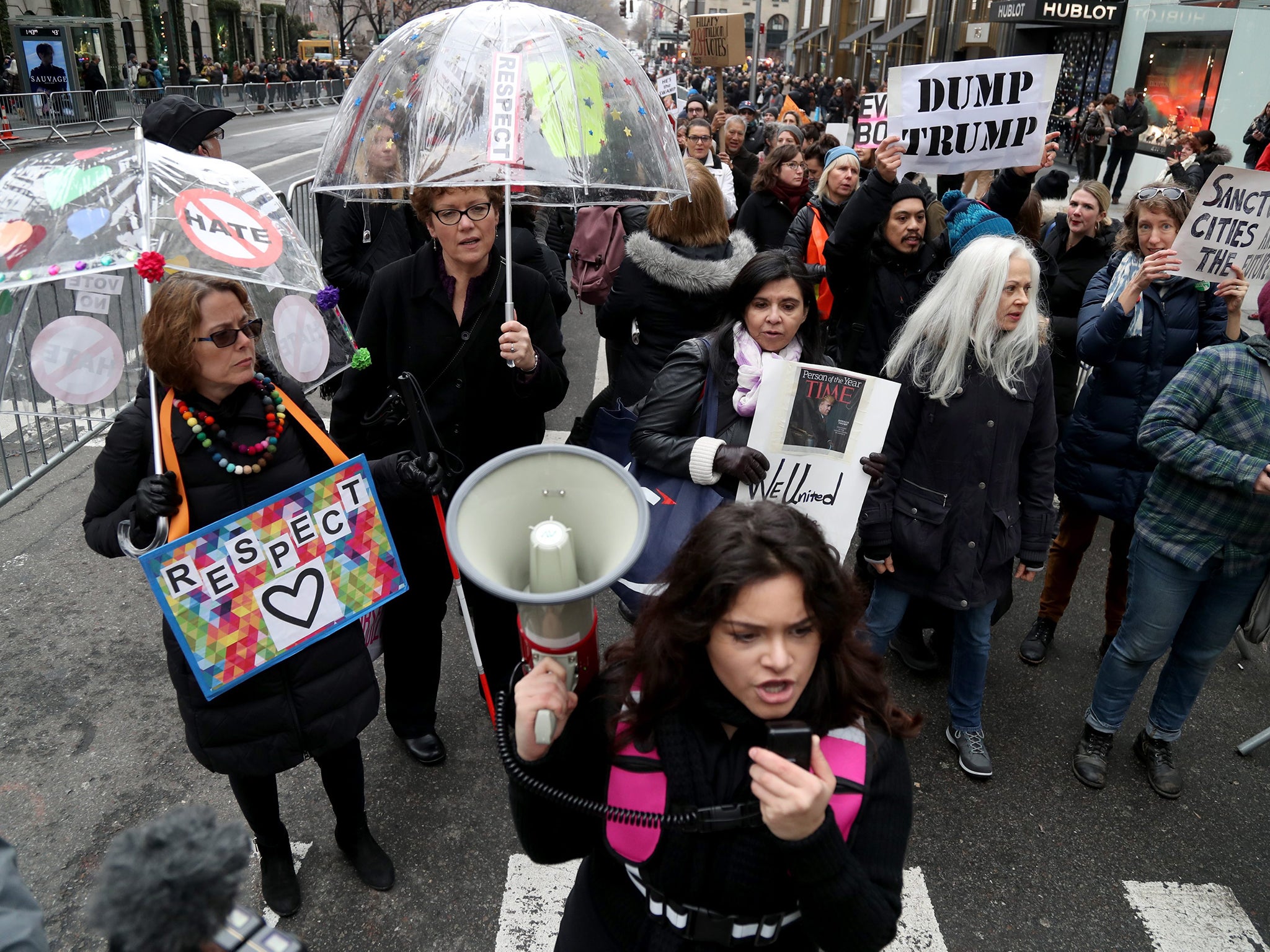As a queer woman I will be marching against Donald Trump this weekend – but for my disabled friends it won't be that easy
I feel threatened as a woman and an LGBTQ+ person, but there are many other groups feeling increasingly threatened and unsafe. Trump has targeted Mexican immigrants, calling them 'rapists' and denied that climate change exists – a phenomenon which predominantly affects people of colour


It’s difficult to count on one hand the number of homophobic slurs I’ve heard in the past few months. From “pervert” to “faggot” to “dyke” to “gay face” – really, who says “gay face”? – it feels terrifying to be out as queer in the UK, in a way that I haven’t experienced before.
Since the Orlando Shooting and the election of Trump in the US, I’ve felt an increased sense of fear amongst LGBTQ+ people. This is not just a fear about what the future holds in terms of politics, but a fear of neighbours we’ve lived next door to for years, or popping round the corner to get some bread and milk.
This past year political tensions have been high, and as a result feminist voices have been pushed to the forefront. It may be 2017, but women are constantly reminded that we’re second class citizens. Women’s refuges are closing fast at the same time that Donald Trump has become President-elect, despite joking about sexual assault and women’s appearances, to name but a few. I understandably have many fears about the years ahead – both as a woman and as a queer person.
It seems to me like there are two clear options about what I can do about this fear – the first is to hide away, disengage with politics and try to pretend that none of this exists. The second is to take to the streets and resist.
I’m taking the second option. I’m taking it not just because it feels right, but because the first option is impossible to achieve. Despite having the Equalities Act and equal marriage, things still aren’t equal for LGBTQ+ people in the UK. We’re still woefully underrepresented in popular culture and not talked about in PSHE lessons in many schools. We’re still kicked out of supermarkets and public bathrooms, and rejected in our own homes. We’re still shouted at on the streets and attacked in hate crimes. This is our daily reality.
And after the US electorate voted for a man who claimed he would back a bill that would prevent trans women from using women’s bathrooms, this march seems to me to be an essential stand of resistance and solidarity. And the state of things is no better for any women. Trump’s win looks to push back against hard won reproductive rights, defund Planned Parenthood and any progress on women’s rights that has been made in the past few years.
But not at all women have the chance to join this march as easily as I do. It’s easy for me to hop on the tube and get to the march, and participate in it with very few barriers, but chatting over the phone recently to some of my disabled friends, the decision of whether or not to go isn’t so simple. For weeks, they have been contacting the organisers via Facebook, trying to find accessibility information regarding the march. Only now has this information been uploaded to the website – just a few days before the march itself.
The efforts to make the march accessible seem to have been scrambled together last minute and not given much thought from the start. One of my friends has said that late notice about accessibility has made it “difficult for (her) to attend.” Another has said that because there is no access fund she won’t be able to make it along. The organisers are not providing toilets and they’ve designated a separate entrance for disabled people – what about if they wish to march alongside non-disabled friends?
Moreover, it’s disappointing that there is not a disabled woman speaking on the most recently released line up. Sisters of Frida are the leading disabled women's group in the country, and yet they haven't been given a slot to speak. Given that Trump is clearly no ambassador for disabled people’s rights – we’ve all heard about how he mocked reporter Serge Kovalesk for his disability – isn’t it even more essential that this march should also be a platform for disabled people to resist and find solidarity?
I’m marching on Saturday because of feeling threatened as a woman and an LGBTQ+ person, but there are many other groups feeling increasingly threatened and unsafe. Trump has called Mexican immigrants “rapists” and denied that climate change exists – a phenomenon which predominantly affects women, in particular women of colour.
Former Ku Klux Clan leader David Duke described Trump’s win as “one of the most exciting nights of (his) life.” That is enough to terrify anyone who belongs to a historically oppressed group.
Our resistance to Trump needs to be strong – but most of all it needs to be inclusive of all people, particularly those whose identity will make them a target of discrimination in the years to come. This includes women, disabled people, people of colour, immigrants, refugees, LBGTQ+ people, Muslims, the working classes and many others, both on a structural and day to day level.
Although I’ve only talked about a selection of oppressed groups here, there are many more that will be facing their own barriers to marching on Saturday. If our spaces are inaccessible to oppressed groups then we are essentially acting exactly as Trump would – we are creating spaces that are exclusionary and far from progressive – and we won’t be resisting at all.


Join our commenting forum
Join thought-provoking conversations, follow other Independent readers and see their replies